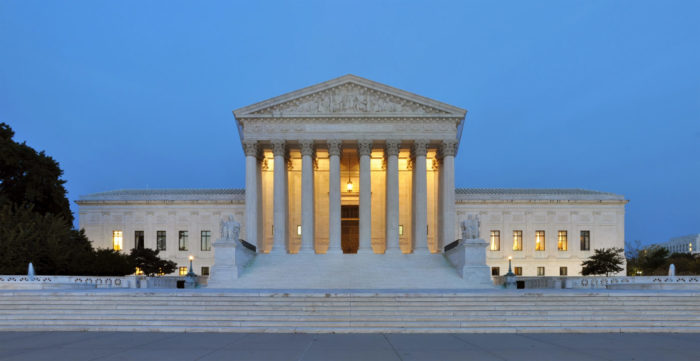Some Ongoing Challenges to State Blaine Amendments and Clauses

In light of the Supreme Court’s granting certiorari to Espinoza v. Montana Department of Revenue last month, it is worthwhile to highlight the fact that the Montana case is not the only ongoing challenge to a state ban on the provision of aid to religious or “sectarian” institutions. Currently, 37 state constitutions feature Blaine amendments, which the Independence Institute and Rob Natelson, our Constitutional Law expert, have covered extensively(especially when Colorado’s own Blaine language was being invoked to help bring an end to Douglas County’s Choice Scholarship Program).
The Supreme Court’s 2017 decision concerning Trinity Lutheran Church of Columbia, Inc. v. Comer helped open the door to challenges of state Blaine laws. The matter at the heart of Trinity Lutheran may initially seem rather trivial, as the case stems from a church’s desire to resurface its playground. To do so, the Columbia, MO church applied for a state grant but was denied funding on the grounds that it was a religious institution and in the eyes of the state of Missouri the publicly accessible playground could not be separated from the church’s religious ministry. Ultimately, the Supreme Court ruled 7-2 in favor of the church, with Chief Justice Roberts writing that,
The Missouri Department of Natural Resources has not subjected anyone to chains or torture on account of religion. And the result of the State’s policy is nothing so dramatic as the denial of political office. The consequence is, in all likelihood, a few extra scraped knees. But the exclusion of Trinity Lutheran from a public benefit for which it is otherwise qualified, solely because it is a church, is odious to our Constitution all the same, and cannot stand.
Since the Trinity Lutheran ruling, the Institute for Justice has taken a very active role in helping bring down state Blaine amendments insofar as they constitute a major barrier to school choice: indeed, Institute for Justice attorneys are representing the parent plaintiffs in Espinoza v. Montana. Alongside the latter, IJ is representing parents and students in two additional Blaine-related school choice cases.
The first of these is currently before the U.S. Court of Appeals for the 1st Circuit and focuses on Maine’s religious ban built into the state’s long-standing school choice program. Because of the region’s rural and occasionally remote nature, many towns in Maine do not operate their own high schools but because the state is constitutionally obligated to provide its citizens with an education from kindergarten through the 12th grade, a state-run voucher system is the commonsense solution that has been in place since the late 19th century. Parents from towns without a school are provided with a sum of money that is not to exceed the state’s average per-pupil spending to cover tuition at any private school of their choice… any, so long as they don’t choose a religious school. The law currently barring parents from sending their kids to religious schools has been in force since the 1980s; at the crux of IJ‘s case against the provision is the argument that “excluding families from a public benefit for which they would otherwise be qualified, solely because they have enrolled their children in religious schools, is equally odious [as the Missouri ban challenged in Trinity Lutheran v. Comer.”
The third and most recent case comes from Washington and focuses on the state’s work study program (WSAC) for low- and middle-income college students. Aimed to “build students’ skills, increase their earnings, and reduce reliance on student loans,” the program provides state funds to cover a portion of the participant’s wages for work with an on- or off-campus employer, generally in a field directly related to the student’s area of academic concentration. Participating employers range from local government, to non-profit organizations, to businesses small and large. In applying to participate in WSAC, employers fill out a questionnaire, which among other questions asks them whether or not the tasks that prospective work study students would be asked to fulfill are “free from sectarian interest.” Because Trinity Lutheran stressed that laws must be “neutral and generally applicable without regard to religion” and “single out the religious for disfavored treatment,” the plaintiffs in IJ‘s Washington case believe that the regulations surrounding Washington’s work study program (brought about by the state’s Blaine clauses) are unconstitutional in that they expressly discriminate against “sectarian” employees.